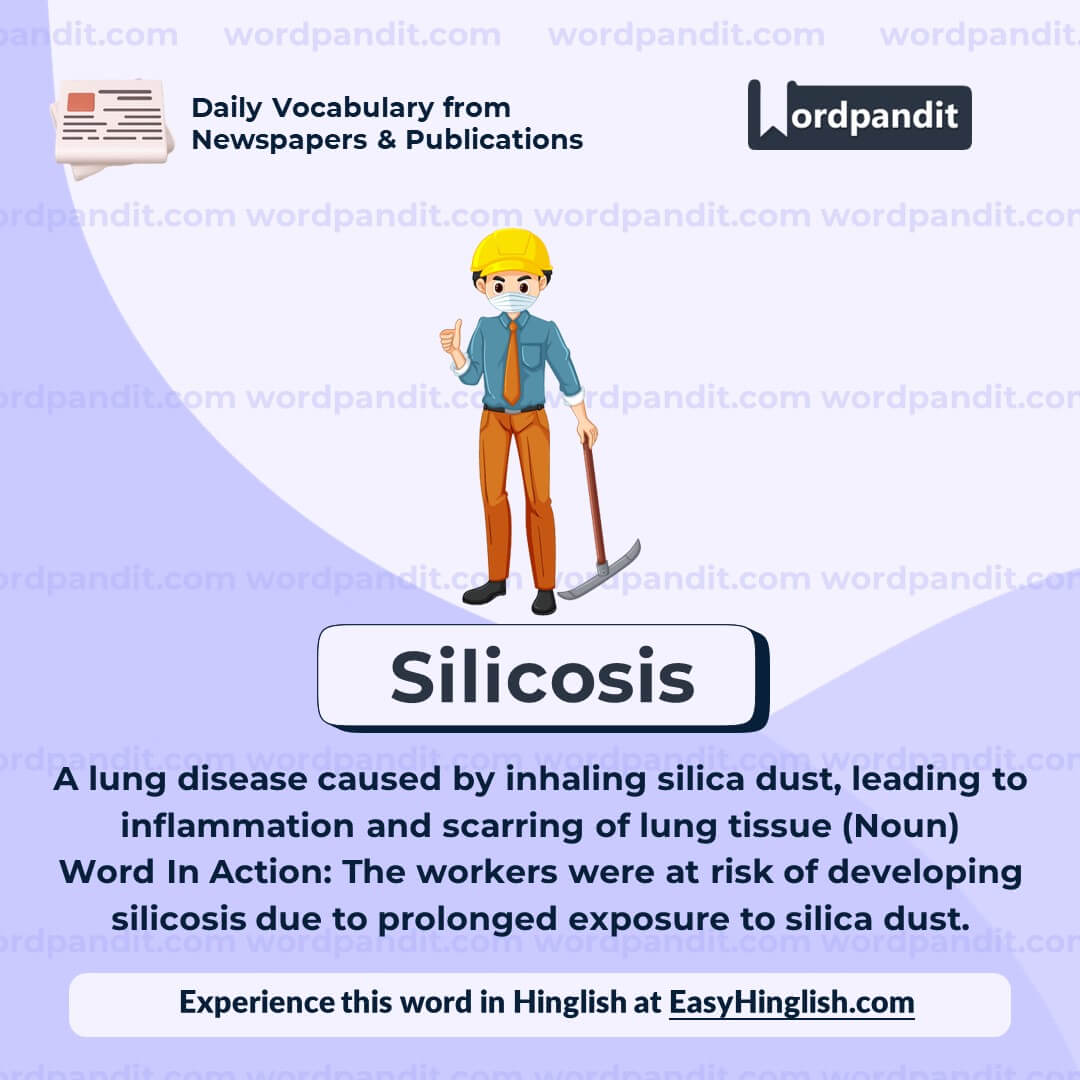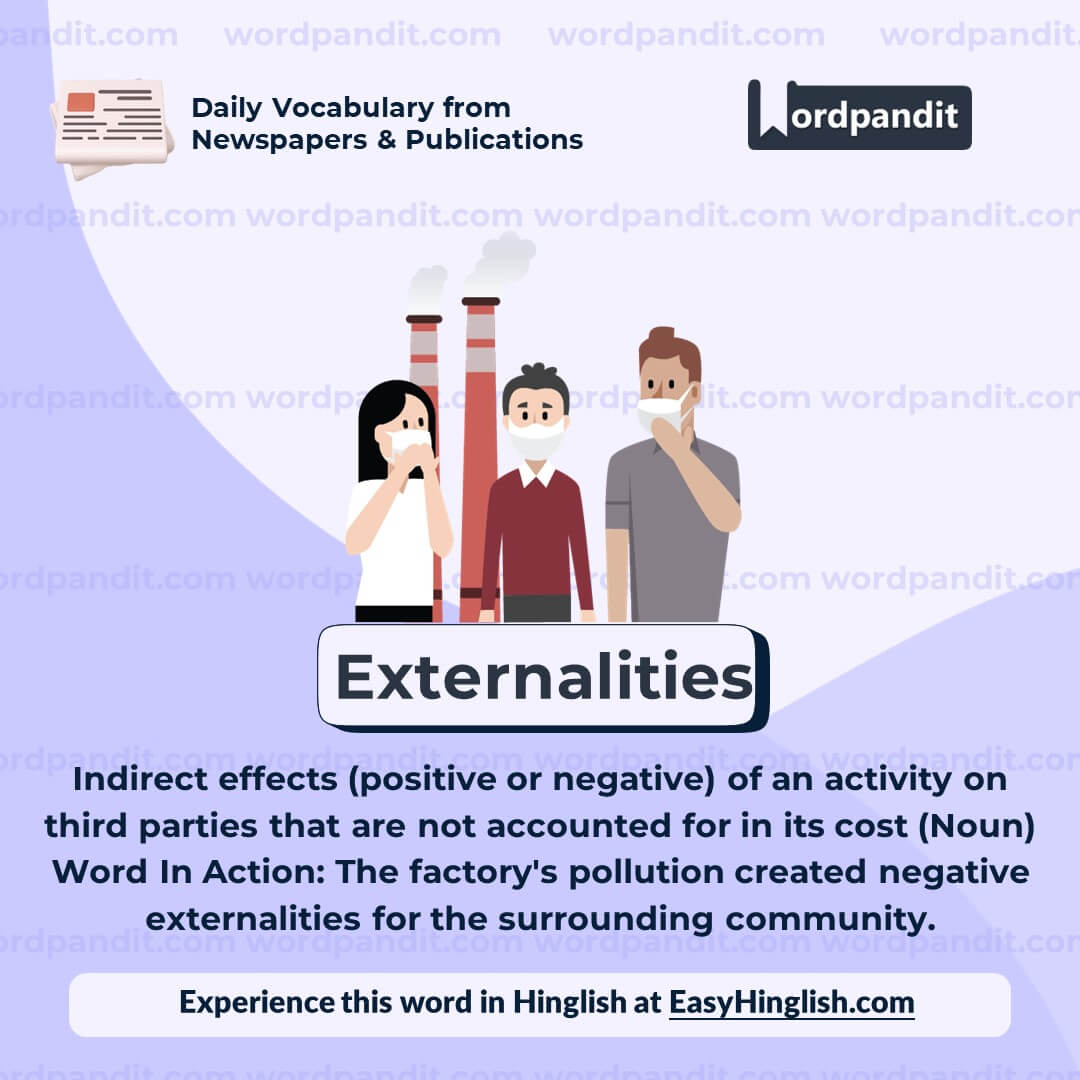Daily Vocabulary from Indian Newspapers and Publications
Welcome to Wordpandit’s Indian Vocabulary Hub
At Wordpandit, we understand the importance of staying rooted in the local context while expanding your language skills. This section focuses on enriching your vocabulary with words and phrases drawn from India’s leading newspapers and publications, ensuring you're learning vocabulary that is practical, relevant, and uniquely Indian.
Why Indian Sources Matter
We believe that the best way to master any language is by immersing yourself in local content. That’s why we carefully curate vocabulary from top Indian publications, including:
- The Hindu
- The Times of India
- The Economic Times
- Hindustan Times
- Live Mint
- The Indian Express
- And many others...
Stay Updated, Stay Relevant
With daily updates from Indian news sources, you’ll be consistently learning words that reflect the trends and shifts in Indian society and culture. Our focus is to provide vocabulary that enhances your understanding of the language in an Indian context.
How Wordpandit Supports Your Goals
Whether you’re preparing for exams, aiming to improve your professional communication, or simply want to stay connected with the latest Indian vocabulary, Wordpandit is here to guide you every step of the way.
Learn with a Practical Approach
Our interactive learning methodology includes real-world examples, engaging activities, and context-specific usage to ensure that every word becomes part of your active vocabulary.
Dive into Indian Vocabulary Today!
Why Choose Wordpandit?
Practical Learning: Focus on words you'll actually encounter in real-world reading, enhancing your comprehension and communication skills.
Diverse Content: From current affairs to scientific breakthroughs, our varied sources expose you to vocabulary across multiple domains.
Effortless Integration: Make Wordpandit a part of your daily routine. Just a few minutes each day can significantly boost your lexicon over time.
Your Path to Vocabulary Mastery
- Visit our Daily Vocabulary section regularly
- Explore new words and their usage in context
- Practice incorporating these words into your own writing and speech
- Track your progress as your vocabulary expands
Start Your Journey Today
Embark on your vocabulary enhancement journey with Wordpandit. By consistently engaging with our daily posts, you'll build a robust vocabulary that serves you well in academic, professional, and personal contexts.
Remember, a word a day keeps linguistic limitations at bay. Make Wordpandit your daily companion in the quest for vocabulary excellence!
WORD-1: Conventional
Context:
"Their practices 'to accurately measure the conventional notion of poverty'." - The Wire
Explanatory Paragraph:
The word "conventional" refers to something that is based on established practices, norms, or standards. It often denotes something traditional or commonly accepted as the norm. For example, a "conventional idea" is one that aligns with typical ways of thinking or doing things.
Meaning: Based on or in accordance with what is generally done or believed (Adjective)
Pronunciation: kuhn-ven-shuh-nuhl
Difficulty Level: ⭐⭐ Beginner
Etymology: From the late Middle English period, derived from the Latin word "convention-", meaning "meeting or assembly," which in turn comes from "convenire," meaning "to come together."
Synonyms & Antonyms:
Synonyms: traditional, customary, orthodox, usual, typical
Antonyms: unconventional, unorthodox, atypical, innovative, original
Usage Examples:
- The teacher's methods were strictly conventional, relying heavily on textbooks and lectures.
- Instead of a conventional wedding, they decided to have a beach ceremony with only close family and friends.
- In conventional farming, synthetic fertilizers and pesticides are commonly used.
- The artwork challenged conventional ideas of beauty and aesthetics.
Cultural Reference:
"Conventional wisdom often dictates our decisions, but challenging these norms can lead to groundbreaking discoveries and innovations." This concept is frequently explored in self-help books and motivational talks. - Paraphrased from popular sources
Think About It:
Why do you think conventional ideas often feel more comfortable and acceptable, even if they may not always be the best solution?
Quick Activity:
List 3 examples of conventional practices in your culture or community. Then, think about one unconventional alternative to each of these practices.
Memory Tip:
Think of "conventional" as "convenient and traditional" since it refers to ideas or practices that are easy to accept because they align with what people are used to.
Real-World Application:
The word "conventional" is often used in debates about innovation versus tradition, such as in business strategies, education systems, and even lifestyle choices. For example, conventional energy sources like coal and oil are increasingly being challenged by renewable alternatives like solar and wind power.
WORD-2: Conspiracy
Context:
"EU’s 'conspiracy of silence on human rights.' They conclude that the EU and India 'must centre their expanding relationship on human rights and discuss their human rights record' if not, the EU’s growing relationship with India will have 'feet of clay'." - The Wire
Explanatory Paragraph:
The word "conspiracy" refers to a secret plan made by a group of people to carry out an unlawful, harmful, or deceitful act. It often implies a covert agreement or collaboration intended to manipulate, deceive, or harm others, frequently involving political or social contexts. For example, a "conspiracy of silence" occurs when individuals deliberately avoid discussing or exposing a troubling issue.
Meaning: A secret plan by a group to do something unlawful or harmful (Noun)
Pronunciation: kuhn-spir-uh-see
Difficulty Level: ⭐⭐⭐ Intermediate
Etymology: From the late Middle English word "conspiracie," derived from the Latin "conspirare," meaning "to breathe together" or "to agree together."
Synonyms & Antonyms:
Synonyms: plot, scheme, collusion, intrigue, machination
Antonyms: openness, transparency, honesty, truth
Usage Examples:
- The whistleblower exposed a conspiracy to manipulate the stock market for personal gain.
- Many believe the assassination was the result of a political conspiracy involving multiple parties.
- A conspiracy of silence among officials allowed the corruption to continue unchecked for years.
- The novel revolves around a gripping conspiracy to overthrow the government.
Cultural Reference:
The term "conspiracy theory" became prominent during the late 20th century, particularly with events like the assassination of President John F. Kennedy and the moon landing. Many people created elaborate conspiracies suggesting hidden truths behind these events, despite a lack of evidence. - General Cultural Insight
Think About It:
Why do you think conspiracy theories often gain popularity, even when they lack substantial evidence?
Quick Activity:
Write a short fictional story involving a conspiracy. Ensure your story includes at least three characters collaborating secretly to achieve their goal.
Memory Tip:
Remember "conspiracy" by associating it with "conspire," meaning to secretly work together on a plan. Picture a group of people whispering in a corner, plotting something suspicious!
Real-World Application:
"Conspiracy" is often used in legal, political, and social contexts. For instance, "conspiracy to commit fraud" is a criminal charge where individuals collaborate to deceive or harm others. It also appears in global discussions about corruption, human rights, and transparency.
WORD-3: Silicosis
Context:
"Several studies link long exposure to construction activities...can cause diseases like cancers, silicosis, lung impairment, and fibrosis." - The Wire
Explanatory Paragraph:
"Silicosis" is a severe lung disease caused by inhaling fine particles of silica dust, often found in construction, mining, and quarrying environments. Prolonged exposure to silica dust leads to inflammation and scarring of lung tissue, impairing the ability to breathe properly. Silicosis is incurable but preventable through safety measures like wearing protective masks and minimizing dust exposure.
Meaning: A lung disease caused by inhaling silica dust, leading to inflammation and scarring of lung tissue (Noun)
Pronunciation: sih-lih-koh-sis
Difficulty Level: ⭐⭐⭐ Advanced
Etymology: From the Latin "silica," meaning "flint" or "hard stone," combined with the medical suffix "-osis," denoting a condition or disease. First used in the late 19th century as industrialization increased silica exposure.
Synonyms & Antonyms:
Synonyms: pneumoconiosis, occupational lung disease, industrial respiratory illness
Antonyms: (None specific, but related terms for healthy lungs include well-functioning lungs, healthy respiratory system)
Usage Examples:
- Workers without proper safety equipment are at risk of developing silicosis from prolonged exposure to silica dust.
- The government implemented stricter regulations to prevent silicosis among quarry workers.
- The symptoms of silicosis include chronic cough, shortness of breath, and chest pain.
- Silicosis has been recognized as one of the deadliest occupational diseases in the mining sector.
Cultural Reference:
Silicosis was the focus of a landmark labor rights movement in the 20th century, particularly in mining and construction industries, highlighting the need for worker protection and compensation. Documentaries and campaigns about the condition have shed light on the plight of affected workers worldwide. - General Occupational Health Insight
Think About It:
What can industries and governments do to balance economic growth in construction and mining with the health and safety of workers exposed to silica dust?
Quick Activity:
Research and list three industries where workers are most at risk of developing silicosis. Suggest one safety measure that can reduce this risk for each industry.
Memory Tip:
Think of "silicosis" as a condition caused by "silica" dust. Picture a cloud of dust forming the word "silicosis" to remember its connection to lung damage.
Real-World Application:
Silicosis is a critical topic in workplace safety and public health discussions. Companies in construction, mining, and glass manufacturing must adopt dust control measures, provide safety equipment, and conduct regular health checkups to protect workers from this preventable disease.
WORD-4: Externalities
Context:
"This construction activity, which creates negative externalities by increasing air, noise and water pollution." - The Wire
Explanatory Paragraph:
The word "externalities" refers to the unintended side effects or consequences of an activity that affect third parties who are not directly involved. These effects can be positive (benefits) or negative (costs). For example, pollution from factories is a negative externality because it harms people who are not directly involved in production. Externalities are a key concept in economics when discussing the broader impact of individual or corporate actions on society.
Meaning: Indirect effects (positive or negative) of an activity on third parties that are not accounted for in its cost (Noun)
Pronunciation: eks-ter-nal-uh-tees
Difficulty Level: ⭐⭐⭐ Intermediate
Etymology: From the Latin word "externus," meaning "outside," combined with the suffix "-ity," referring to a state or condition. The term began being widely used in economic theory in the late 19th century.
Synonyms & Antonyms:
Synonyms: spillovers, side effects, repercussions, unintended consequences
Antonyms: direct effects, internal benefits, intrinsic costs
Usage Examples:
- Factories that pollute rivers create negative externalities for nearby communities reliant on clean water.
- Subsidizing public transport reduces the negative externalities of traffic congestion and air pollution.
- Urban green spaces create positive externalities by improving air quality and providing recreational areas.
- The noise from the new airport has become a negative externality for residents living nearby.
Cultural Reference:
The concept of externalities became a cornerstone of modern economic theory through the work of economist Arthur Pigou in the early 20th century. His ideas on "Pigouvian taxes" suggested taxing negative externalities, such as pollution, to encourage industries to reduce their environmental impact. - Economic History Insight
Think About It:
Should governments impose taxes or stricter regulations on industries to address negative externalities like pollution, even if it increases the cost of goods and services for consumers?
Quick Activity:
List three examples of negative externalities and three examples of positive externalities in your local area. Discuss how each of these externalities could be managed or encouraged.
Memory Tip:
Think of "externalities" as "external effects." Remember it by associating the term with impacts that go beyond the immediate activity, spilling over to others.
Real-World Application:
"Externalities" are central to discussions about climate change, urban development, and public health. For example, governments impose carbon taxes to address the negative externality of greenhouse gas emissions, while subsidies for renewable energy aim to promote positive externalities like cleaner air and reduced dependency on fossil fuels.
WORD-5: Subsidies
Context:
"The discussions surrounding potential solutions for pollution caused by construction...while ignoring their working conditions, which includes the intergenerational impact on their families, is an indicator that neither are they seen as equal stakeholders, nor are they given anything more than subsistence." - The Wire
Explanatory Paragraph:
"Subsidies" refer to financial assistance or incentives provided by governments or organizations to support businesses, industries, or individuals. These funds are often granted to encourage certain activities, make goods or services more affordable, or mitigate financial hardships. For example, agricultural subsidies help farmers reduce costs, while energy subsidies promote renewable energy adoption.
Meaning: Financial aid or incentives provided by a government or organization to support businesses, industries, or individuals (Noun)
Pronunciation: suhb-sih-deez
Difficulty Level: ⭐⭐ Beginner
Etymology: From the Latin word "subsidium," meaning "support or assistance," the term entered English through Old French in the 14th century. Originally, it referred to aid provided in times of military or financial need.
Synonyms & Antonyms:
Synonyms: financial aid, grant, allowance, funding, support
Antonyms: taxation, levy, burden, surcharge
Usage Examples:
- The government provides subsidies to small businesses to help them recover from economic downturns.
- Energy subsidies have been introduced to encourage the use of renewable energy sources like solar and wind power.
- Farmers rely on subsidies to manage the high costs of fertilizers, equipment, and seeds.
- Critics argue that fossil fuel subsidies discourage investment in cleaner energy alternatives.
Cultural Reference:
Subsidies have been a cornerstone of economic policy in many nations. For example, during the Great Depression in the 1930s, the United States introduced agricultural subsidies as part of the New Deal to support struggling farmers. This concept continues to influence debates on economic growth, inequality, and environmental sustainability. - Historical Economic Insight
Think About It:
Should governments continue providing subsidies to industries that harm the environment, or should subsidies be redirected exclusively to eco-friendly initiatives?
Quick Activity:
List three sectors in your country that currently benefit from subsidies. Research one subsidy and evaluate its impact on the economy and society.
Memory Tip:
Think of "subsidies" as "support systems." Visualize a helping hand holding up struggling sectors like farming, education, or clean energy to remember its meaning.
Real-World Application:
Subsidies are used to address economic inequality, support emerging industries, and encourage environmental sustainability. For instance, subsidies for electric vehicles aim to make them more affordable, promoting green transportation and reducing carbon emissions. Similarly, agricultural subsidies ensure food security by supporting farmers.


















